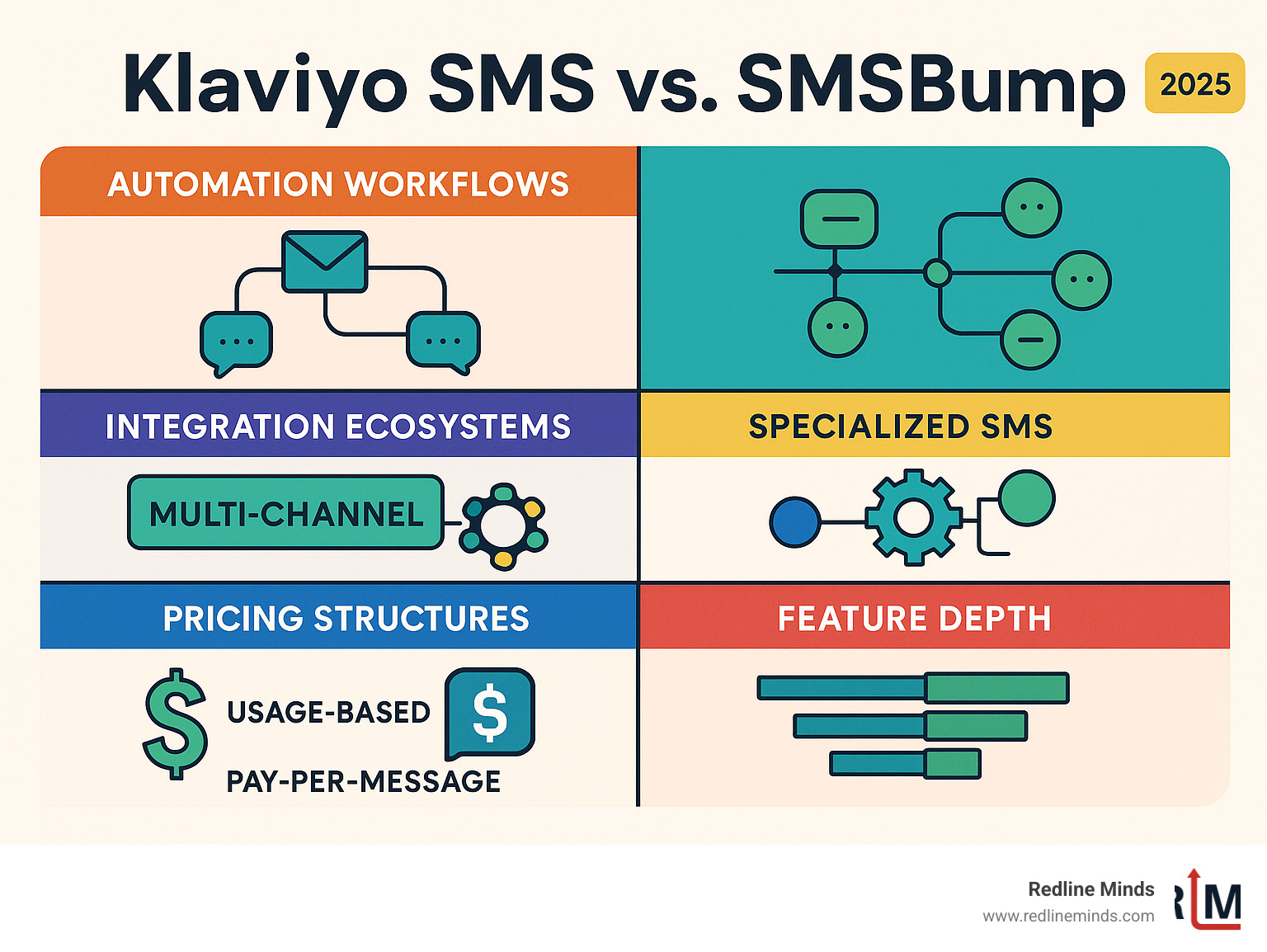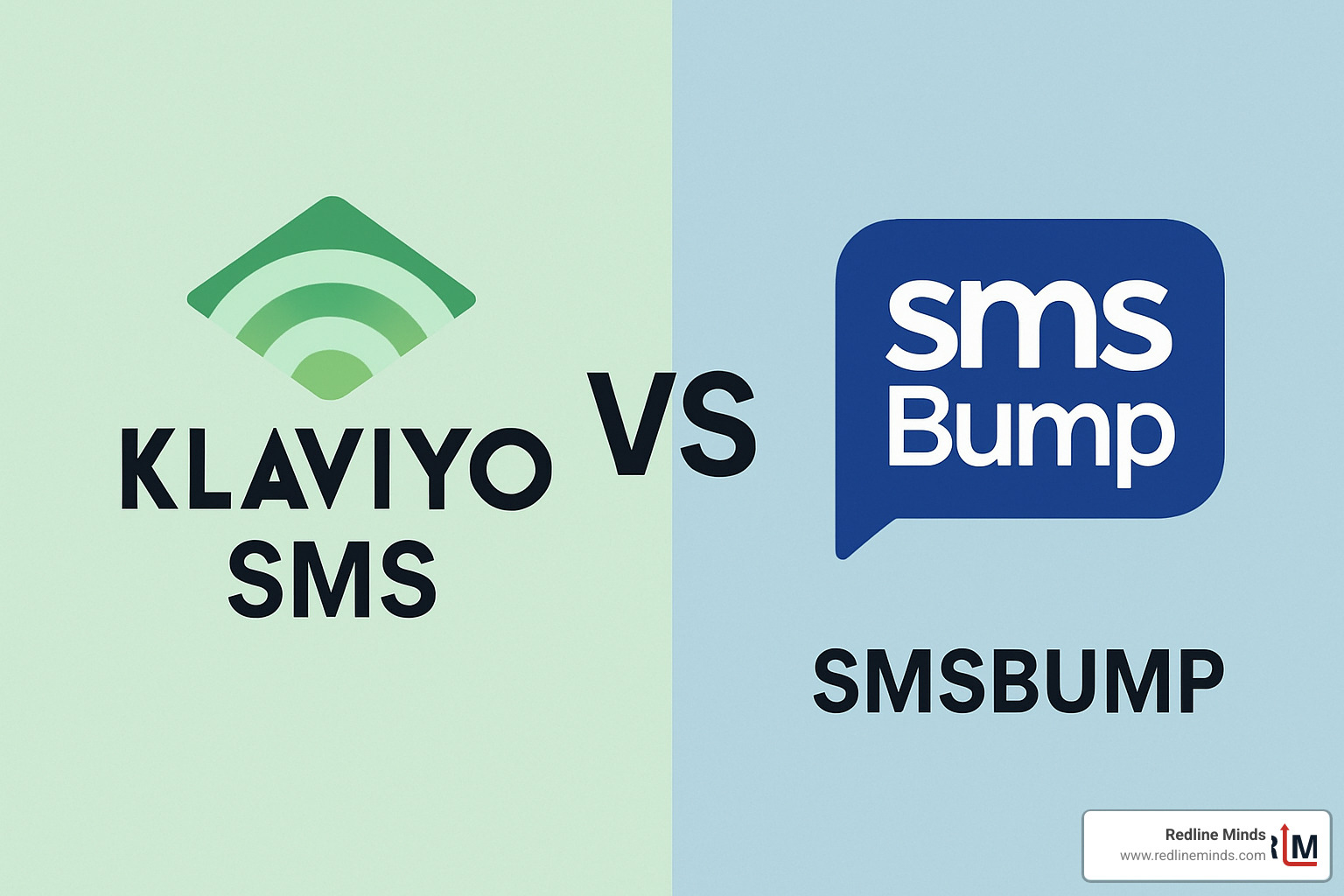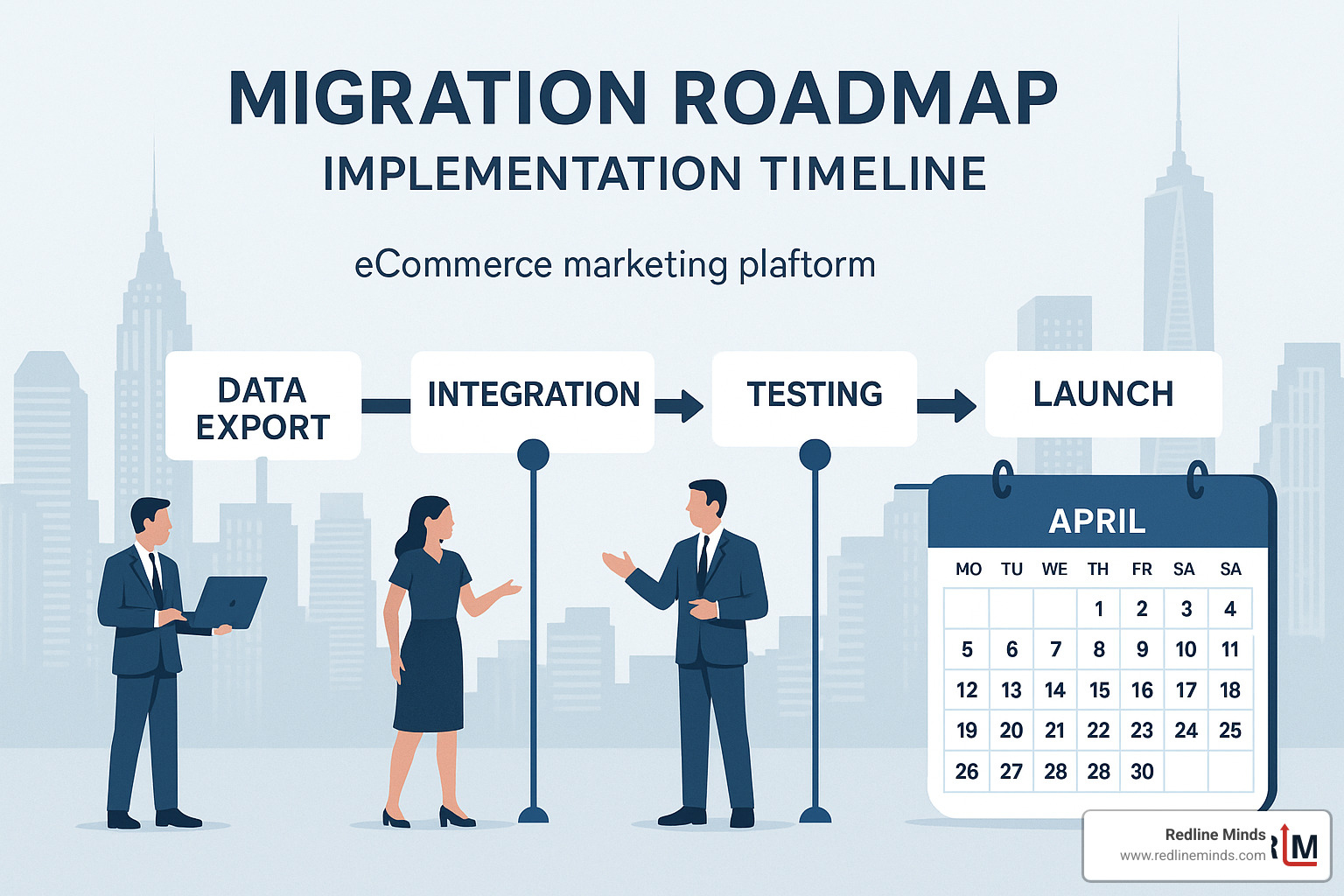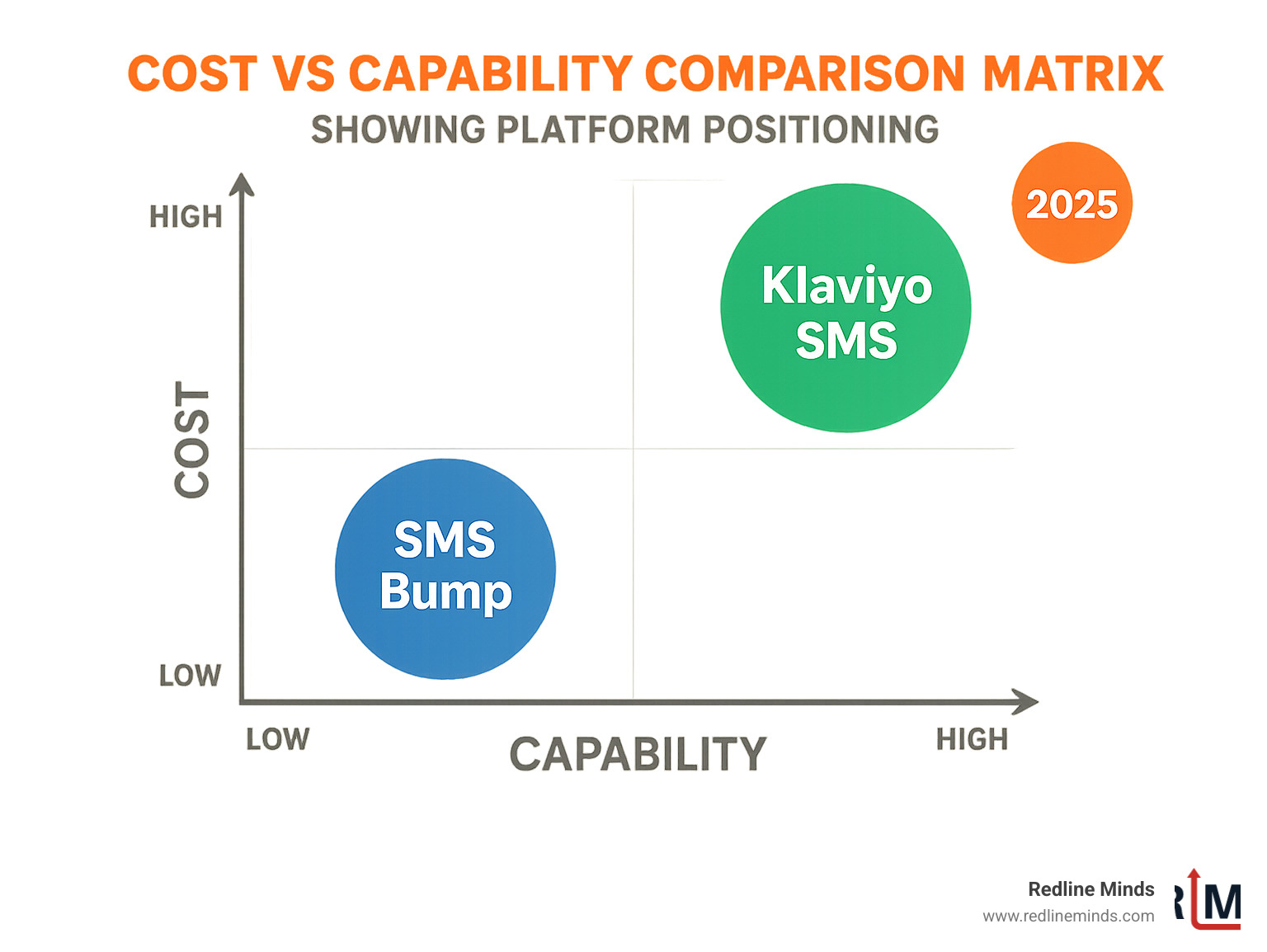Texting Titans Clash: Klaviyo SMS Battles SMSBump

Why SMS Marketing Platform Choice Drives Revenue Growth
Klaviyo SMS vs SMSBump is one of the most searched comparisons among mid-sized online retailers looking to boost their messaging strategy. SMS achieves 95% open rates and most messages are read within minutes. However, choosing the right platform can dramatically impact your bottom line.
Quick Comparison:
| Feature | Klaviyo SMS | SMSBump |
|---|---|---|
| Primary Focus | Multi-channel (email + SMS) | SMS-specialized |
| Best For | Unified marketing automation | Dedicated SMS campaigns |
| Integration Depth | 350+ pre-built integrations | Shopify-centric approach |
| Learning Curve | Steeper (more features) | Simpler setup |
| Pricing Model | Usage-based credits | Pay-per-message |
The choice between these platforms often comes down to whether you want SMS as part of a broader marketing ecosystem or as your primary engagement channel.
Klaviyo positions itself as a comprehensive marketing powerhouse where SMS works alongside email automation and customer data platforms. SMSBump focuses specifically on SMS excellence, offering streamlined workflows and Shopify-native features.
For retailers doing $1-10 million annually, this decision impacts more than just monthly costs. It affects your team’s workflow, customer data management, and ability to create sophisticated automation sequences that drive repeat purchases.

Core Features of Top-Tier SMS Marketing Platforms
When we help ecommerce businesses choose between platforms like Klaviyo SMS vs SMSBump, we dig deeper than basic text-sending features. The best SMS marketing platforms offer sophisticated segmentation tools, multi-step automation flows, genuine two-way messaging, and unified dashboards that give you a complete picture of customer interactions.
Feature breadth varies dramatically between platforms. Some focus exclusively on SMS excellence, while others position SMS as part of a broader marketing ecosystem. The right choice depends on whether you want SMS to work alongside your email campaigns or serve as your primary customer engagement channel.
| Platform Feature | Multi-Channel Approach | SMS-Specialized Approach |
|---|---|---|
| Segmentation | Cross-channel data insights | SMS-focused behavioral triggers |
| Automation | Email + SMS unified workflows | Dedicated SMS automation flows |
| Templates | Coordinated campaign designs | SMS-optimized message templates |
| Dashboards | Unified marketing metrics | SMS performance focus |
| Integration | 350+ platform connections | Deep ecommerce integrations |

Integrations & Ecosystem Overview
Your SMS platform needs to play nicely with your existing tools. Shopify, WooCommerce, and BigCommerce integrations are table stakes for any serious ecommerce SMS platform. But the depth of these integrations matters enormously.
The most comprehensive platforms offer 350+ pre-built integrations that connect everything from your advertising accounts to your customer service tools. This extensive API depth means your SMS campaigns can use data from Facebook Ads, Google Analytics, Zendesk, and dozens of other platforms you’re already using.
More specialized platforms take a different approach. Instead of trying to integrate with everything, they focus on deep, native connections with core ecommerce tools. These integrations are often more streamlined and easier to set up, especially if your tech stack is relatively simple.
Automation Depth & Flexibility
The best automation engines don’t just send messages – they create intelligent conversations that adapt based on customer behavior.
Welcome series automation should customize messages based on how customers joined your list, what products they’ve viewed, or even their predicted lifetime value.
Abandoned cart triggers need to be smart. The best platforms won’t send the same generic reminder to someone who abandoned a $20 item and someone who left a $500 purchase in their cart. Conditional logic lets you create different paths for different customer segments.
Predictive analytics takes automation to the next level. Advanced platforms can predict what customers are likely to do next, sending retention messages to customers showing early churn signals or promoting complementary products based on purchase patterns.
Some platforms now include SMS Assistant features that use AI to help you write better messages, suggesting copy that stays within character limits while maintaining compliance and following SMS best practices.
Pricing, Scalability & Overall Value
SMS marketing costs go beyond the monthly fee. When we help clients choose between platforms, we always examine the real investment they’re making.

Klaviyo’s Credit-Based Approach
Klaviyo treats SMS and email like two sides of the same coin. Their credit system lets you buy communication capacity that works across both channels. This approach makes sense if you’re already thinking about email marketing or want to create unified customer journeys.
The beauty of this system? You’re not locked into separate budgets for each channel. Busy month for SMS? Your credits flex to accommodate. Email-heavy campaign next month? Same credits work there too.
SMSBump’s Straightforward Model
SMSBump keeps things simple with pay-per-message pricing. You send ten messages, you pay for ten messages. No complex calculations or credit conversions – just transparent costs that make budgeting straightforward.
For SMS-focused strategies, this model often provides better cost predictability. You know exactly what each campaign will cost before hitting send.
Breaking Down the Numbers
The per-message rate is just one piece of the puzzle. Short code fees can catch you off guard. These one-time setup costs improve your deliverability and give you branded sending numbers, but they represent a significant upfront investment.
Both platforms may charge extra for premium features like advanced analytics, priority support, or improved automation capabilities. We always recommend factoring these potential add-ons into your decision.
When Growth Spikes
Nothing tests a platform like success. When your Black Friday campaign goes viral or a product launch exceeds expectations, your SMS costs can spike dramatically.
Klaviyo’s credit system handles these surges more gracefully. You’re buying communication capacity that can shift between channels as needed.
SMSBump’s per-message model gives you predictable per-unit costs but requires careful monitoring during high-volume periods. The good news? You’ll never pay for capacity you don’t use.
We’ve seen businesses experience 300% traffic increases during peak seasons. The platform that seemed more expensive during normal months suddenly became the budget-friendly option when volume exploded.
Personalization, Deliverability & Compliance
Getting your SMS messages delivered is just the starting point. The real magic happens when you combine smart personalization with rock-solid compliance practices. When evaluating Klaviyo SMS vs SMSBump, understanding how each platform handles these critical elements can make or break your messaging strategy.

Staying on the Right Side of the Law
Both platforms take compliance seriously, but they approach it differently. SMS marketing falls under strict regulations like GDPR and TCPA, and violations can result in hefty fines.
Klaviyo offers comprehensive consent management that tracks every detail of how customers opted in. They record timestamps, sources, and methods across both email and SMS channels. This unified approach means you’re not juggling different compliance systems.
SMSBump focuses exclusively on SMS compliance, building these features directly into every workflow. Their system automatically handles opt-out keywords, appends required compliance messages, and manages consent records specifically for text messaging.
Segmentation Superpowers
The ability to send the right message to the right person can dramatically boost your results. Research consistently shows that highly segmented campaigns significantly outperform generic blast messages, with top performers seeing 7x more revenue per recipient.
Klaviyo’s Data-Driven Approach
Klaviyo’s segmentation engine uses real-time data from multiple sources to create dynamic audience segments that update automatically as customers interact with your brand.
You can target customers based on purchase history, browsing patterns, email engagement, and even predictive analytics like likelihood to purchase or churn risk. Their personalization tactics include AI-powered product recommendations and behavioral triggers that adapt messaging based on individual customer journeys.
SMSBump’s Behavioral Focus
SMSBump creates segments based on SMS-specific behaviors like message engagement, reply patterns, and opt-in sources. While simpler than Klaviyo’s multi-channel approach, these segments are laser-focused on what matters for text messaging success.
Staying Legal & Respectful
Compliance isn’t just about avoiding lawsuits – it’s about building trust with your customers. Both platforms offer smart sending features that prevent message fatigue, but they approach it differently.
Klaviyo coordinates across email and SMS to ensure customers don’t get overwhelmed with communications from multiple channels. SMSBump’s smart sending focuses specifically on SMS timing and frequency, using engagement data to determine optimal send times for individual subscribers.
Analytics, Reporting & Support Resources
When you’re investing time and money into SMS marketing, you need to know what’s working and what isn’t. The difference between platforms often comes down to how well they help you understand your results and improve your campaigns.

Klaviyo’s Unified Reporting Approach
Klaviyo treats SMS as part of your bigger marketing picture. Their dashboards show how text messages work alongside email campaigns, social media, and other channels. This bird’s-eye view helps you understand the complete customer journey.
The platform includes benchmarking features that compare your results against similar businesses. Their AI insights feature analyzes your campaign data and suggests improvements, noticing patterns like optimal send times or high-performing product categories.
SMSBump’s SMS-Focused Analytics
SMSBump puts all its energy into SMS-specific metrics. Their reporting dives deep into text message performance, showing delivery rates, engagement patterns, and conversation analytics for two-way messaging.
The platform excels at tracking keyword performance and subscriber acquisition sources. Their A/B testing tools are built specifically for SMS constraints, letting you test different message lengths, emoji usage, and call-to-action styles within character limits.
Measuring What Matters
The metrics that matter most for SMS success go beyond basic open rates. Delivery rates tell you if your messages are reaching customers. Click-through rates show engagement levels. Revenue per recipient reveals the actual business impact.
Klaviyo’s Attribution Advantage
Klaviyo handles attribution complexity with unified tracking. Since they manage both email and SMS, they can provide accurate last-touch attribution with configurable windows. You can see the true impact of SMS within your broader marketing mix without double-counting revenue.
SMSBump’s SMS-Specific Tracking
SMSBump offers detailed SMS attribution that may actually be more accurate for businesses using separate email and SMS platforms. Their tracking focuses exclusively on SMS touchpoints, providing clear visibility into text message performance.
Learning & Troubleshooting
Klaviyo provides extensive documentation, video tutorials, and regular webinars covering both basic SMS concepts and advanced multi-channel strategies. For complex implementations, they offer professional services and dedicated customer success managers.
SMSBump focuses on SMS-specific education and support. Their team specializes exclusively in text message marketing, which means they often have deeper expertise in SMS best practices, compliance issues, and optimization strategies.
For context on how SMS platforms fit into the broader marketing automation landscape, our Klaviyo vs Mailchimp for Shopify comparison provides additional insights into platform selection considerations.
Choosing the Right Fit & Implementation Roadmap
The Klaviyo SMS vs SMSBump decision ultimately comes down to understanding your business’s unique needs and growth ambitions. After helping dozens of ecommerce retailers steer this choice, we’ve learned that the “best” platform is simply the one that aligns with your team’s workflow and marketing strategy.

The SMS-First Question
If text messaging is going to be your primary customer engagement channel, SMSBump’s specialized focus often makes more sense. You’ll get deeper SMS-specific features, simpler workflows, and a team that lives and breathes text marketing.
But if you’re thinking bigger picture – combining email, SMS, and other touchpoints into seamless customer journeys – Klaviyo’s unified approach can save you countless hours of data syncing and campaign coordination.
Migration Planning That Actually Works
Both platforms offer migration assistance, but the process varies significantly based on your current setup. Klaviyo’s migration tools can handle complex data imports from multiple sources, including detailed subscriber history and engagement patterns.
SMSBump keeps things focused on SMS subscriber lists and basic automation flows. If you’re moving from an email-heavy platform to SMS-focused marketing, this streamlined approach can actually be refreshing.
Quick-Start Checklist
Whether you choose Klaviyo or SMSBump, successful SMS marketing follows a predictable pattern. Start by collecting proper consent through your website, checkout process, and customer touchpoints.
Build a welcome flow that introduces new subscribers to your brand and sets clear expectations about message frequency and content. Test your timing relentlessly. What works for email doesn’t necessarily work for SMS.
Monitor your key metrics closely during this testing phase – delivery rates, engagement, and revenue attribution will guide your optimization efforts. The most successful implementations we’ve seen iterate constantly.
Common Pitfalls to Avoid
We’ve watched businesses struggle because they treated SMS like email marketing. Text messages need different timing, frequency, and content approaches. Keep messages concise, actionable, and valuable.
Another mistake we see repeatedly is scaling too quickly without proper testing. Both platforms offer A/B testing capabilities – use them to validate your approach before committing to large-scale campaigns.
Future-Proof Strategies
SMS marketing continues evolving with technologies like AI-generated copy, RCS messaging, and deeper mobile app integration. When choosing between platforms, consider their roadmap for emerging trends.
Klaviyo’s AI-powered features include automated content generation and predictive analytics that can optimize send times and targeting. Their SMS Assistant helps create compliant, effective messages while staying within character limits.
SMSBump’s focus on conversational SMS positions them well for interactive messaging trends. Their two-way communication features align with the industry’s move toward more personalized, responsive customer experiences.
Frequently Asked Questions about SMS Marketing Platforms
Are some SMS marketing solutions more expensive than others?
Yes, but the real question is which pricing model fits your business better. When comparing Klaviyo SMS vs SMSBump, you’re looking at two fundamentally different approaches to pricing.
Klaviyo’s credit-based system bundles email and SMS into shared communication credits. This can be incredibly cost-effective if you’re using both channels, essentially giving you flexibility to allocate your marketing budget across touchpoints as needed.
SMSBump’s pay-per-message model offers more predictable costs for SMS-focused campaigns. You know exactly what each text will cost, making it easier to budget for specific campaigns or seasonal pushes.
The total cost goes beyond just message fees. Setup costs, integration expenses, and team training time all factor into your real investment.
Which platforms integrate best with Shopify Plus?
Both platforms work well with Shopify Plus, but they take different approaches. The choice often comes down to whether you want breadth or depth in your integrations.
Klaviyo offers extensive ecosystem integration with hundreds of apps and services. This makes it ideal for Shopify Plus merchants with complex tech stacks who need their SMS platform to work seamlessly with multiple tools.
SMSBump focuses on deeper Shopify-specific features. Their integration includes native POS connectivity, ecommerce-optimized automation flows, and features specifically designed for Shopify workflows.
How do leading tools handle subscriber opt-outs?
Opt-out management is crucial for compliance and maintaining subscriber trust. Both platforms handle this requirement effectively.
Klaviyo provides unified opt-out management across email and SMS channels. When someone opts out of SMS, their preference is recorded in their unified customer profile, which helps prevent accidental re-engagement through other channels.
SMSBump offers SMS-specific opt-out features, including keyword-based unsubscribes and automatic compliance messaging. Their system is designed specifically for text messaging requirements, with features like automatic “STOP” keyword processing and detailed opt-out logging.
Conclusion
The Klaviyo SMS vs SMSBump decision ultimately comes down to your business priorities and how you want to manage customer relationships. After helping dozens of ecommerce businesses steer this choice, we’ve learned that the “best” platform is the one that fits your team’s workflow and growth strategy.
If you’re building a comprehensive marketing machine, Klaviyo’s unified approach makes a lot of sense. You get one dashboard, one set of customer data, and automation flows that work across email and SMS.
If SMS is your primary focus, SMSBump’s specialized approach often delivers better results. The platform is built specifically for text messaging success, with features and workflows designed around mobile engagement.

The cost-versus-capability matrix shows that both platforms can deliver strong ROI when implemented correctly. Klaviyo offers broader capabilities but requires more investment in learning and setup. SMSBump provides focused capabilities with faster implementation but may require additional tools as you grow.
At Redline Minds, we’ve seen impressive results from both platforms. The businesses that succeed focus on execution rather than features. A simple SMS strategy that you actually use will outperform a sophisticated automation that sits half-finished.
Start with a hands-on trial of both platforms. Set up a basic welcome flow and send some test messages. You’ll quickly find which interface feels more natural for your team.
The SMS marketing landscape keeps evolving with new technologies and regulations. Whichever platform you choose, focus on building genuine relationships with your subscribers. Send messages that add value, respect their time, and make their shopping experience better.
For more insights on building effective marketing strategies that drive real results, check out our comprehensive Ecommerce Email Marketing Guide. It covers the broader marketing automation concepts that work hand-in-hand with SMS campaigns.
The platform is just a tool. Your success depends on understanding your customers, crafting compelling messages, and consistently delivering value. Get those fundamentals right, and either platform can help you build a profitable SMS marketing program.